The Devil All the Time (2020) is a psychological-thriller period film written and directed by Antonio Campos, based on the novel of the same name. It stars an ensemble cast including Tom Holland, Robert Pattinson, Sebastian Stan, Jason Clarke, Riley Keough and others. It tells the story of multiple generations of families living in a small community in post-WWII America. Will this be a star-making turn for young Tom Holland, or is he still yet to break out from the Spidey mold?
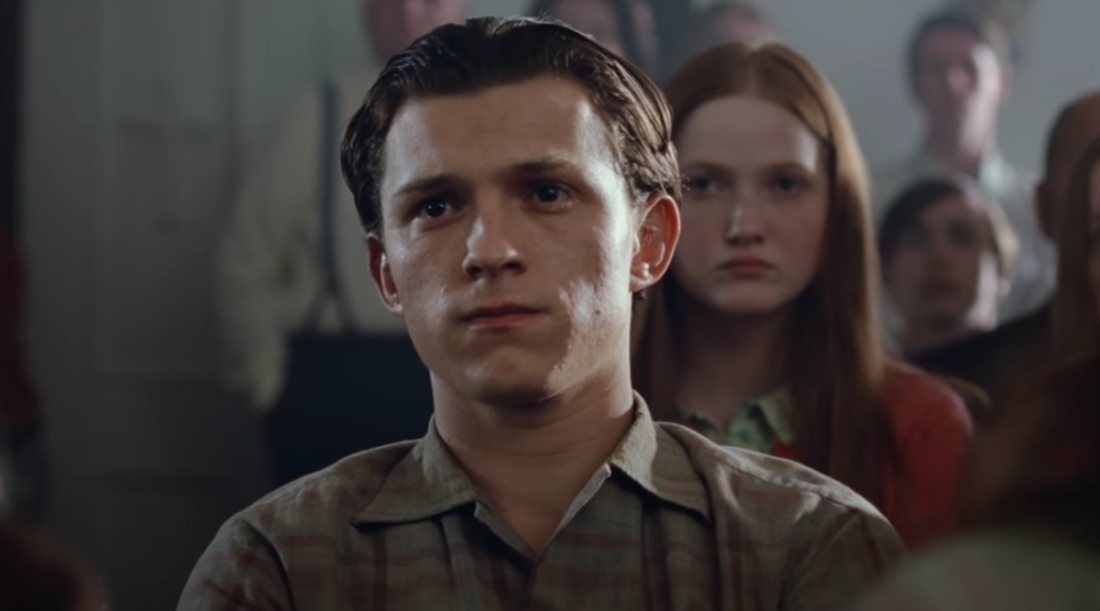
Book adaptations can be a tricky thing to pull off. The literary medium has plenty of overlap with film, but it also has its share of unique attributes that don’t always translate over to a more visual storytelling style. Perhaps most obvious is the ability to get into a character’s head and hear their thoughts, something films can’t handle as well. Often they have to use clunky dialogue and/or voiceover narration to convey what someone is thinking, but that’s usually a band-aid that ignores the core problem: not all books make good films. Sometimes a story is best left on the page, where the audience can properly take in all the context without needing spoon-fed information to tell us everything we need to know. The Devil All the Time is a novel that often requires us to know what people are thinking in crucial moments, so it isn’t necessarily the best choice for a film adaptation. And while the film has its problems that result from such limitations, it’s still a solid experience that was worth making.
The film takes on multiple perspectives of people in this small community whose paths intertwine. The fact that such talented actors are playing all these different roles definitely helps sell this structure, but still leads to some moments of muddled development and awkward pacing. This isn’t as much of a problem for a book, where you can spend as much or as little time talking about a particular character as needed; a film has harsh time constraints that limits the amount of screen time someone can get. As such, certain characters get short-changed while others hog the screen for longer than they ought to. The pacing also drags as a result of needing to tie in all the different storylines and side characters before we get into the meat of the action. We get nearly 1/4 of the way through the film before we even meet our main character!! That’s a bit of a yikes. I can’t say for sure what they should have done instead because everyone they introduce winds up being critical to the plot, so it barely gets a pass from me. It’s unfortunate that they failed to seamlessly integrate all these different threads together, but it’s very possible there was simply no other way to do it efficiently.
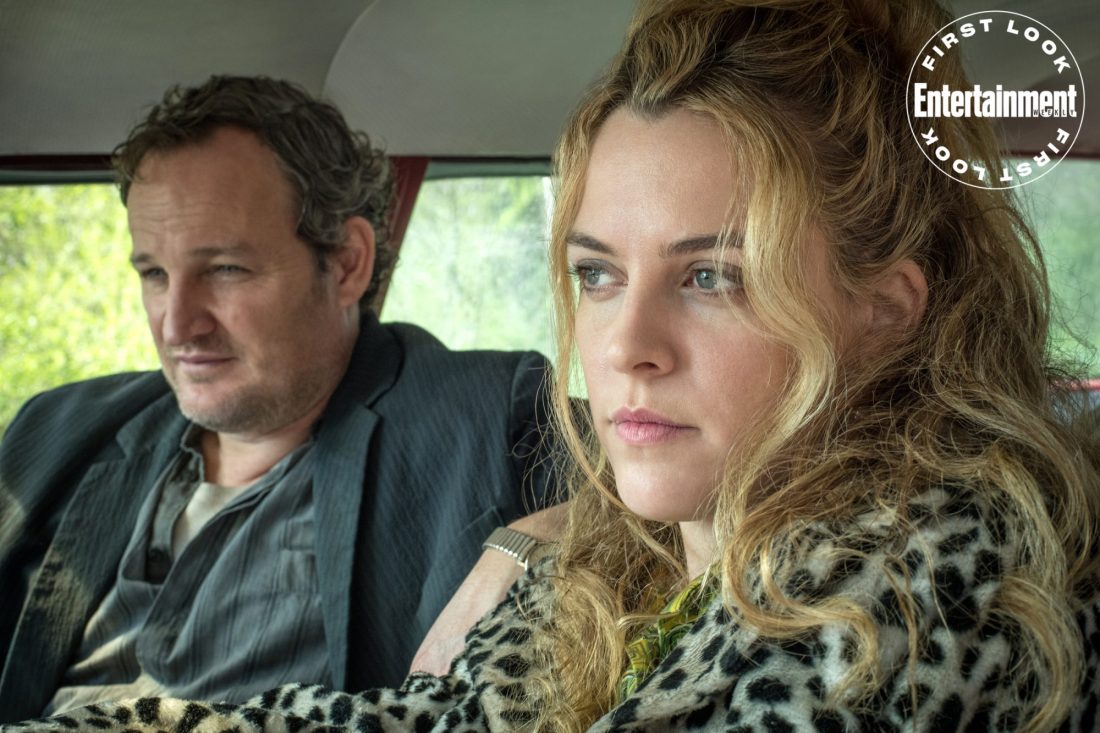
Religion lies at the core of the film, and much of the film revolves around each character’s relationship to their faith. Oftentimes this takes on a very negative connotation, as people’s desperation often leads them to use their religion to take violent actions. Whether it’s killing your own wife because God told you to, or using God as a vehicle to groom young girls, or similarly allowing your pious beliefs to cloud your judgment with exploitative men, rarely does religion create a net positive for characters heavily involved in it. I definitely enjoyed the film’s complex look at faith and violence, but I wish they had gone further down that path. We never really learn what young Arvin’s relationship to religion is – only that he’s a skeptic. Perhaps he is meant to be a conduit for the audience, to learn from the mistakes of others and form his own judgment as a result, but we don’t exactly get that by the end. If his journey was more closely tied to his faith (or lack thereof), it might have made for a more satisfying conclusion. The plot wraps up neatly and all, but thematically it doesn’t quite seal the deal.
This is a dark, dark film. In addition to its candid looks at religion, it tackles heavy subject matter like murder, suicide, and rape. The film frequently seeks to make us uncomfortable by keeping us in the moment longer than we might like: watching a pastor take advantage of a naive girl, seeing an innocent man walk unwittingly into the web of a killer, following a young boy through the worst day of his life that sees both of his parents die. I definitely appreciate when a film doesn’t sugarcoat topics like death and suffering and gives them the treatment they deserve. It helps contextualize the importance of faith in these characters’ lives when their everyday existence is so bleak and hopeless. That said, it does make the viewing experience difficult as there is very little reprieve from the persistent heavy tone. I’m not saying the film needed to throw in a bunch of one-liners or anything, but it’s definitely tough to get through. And hey, if there’s anything to take away from this review, it’s that I couldn’t come up with a better solution to the film’s problems so they probably did the best they could with the limitations beset upon them.
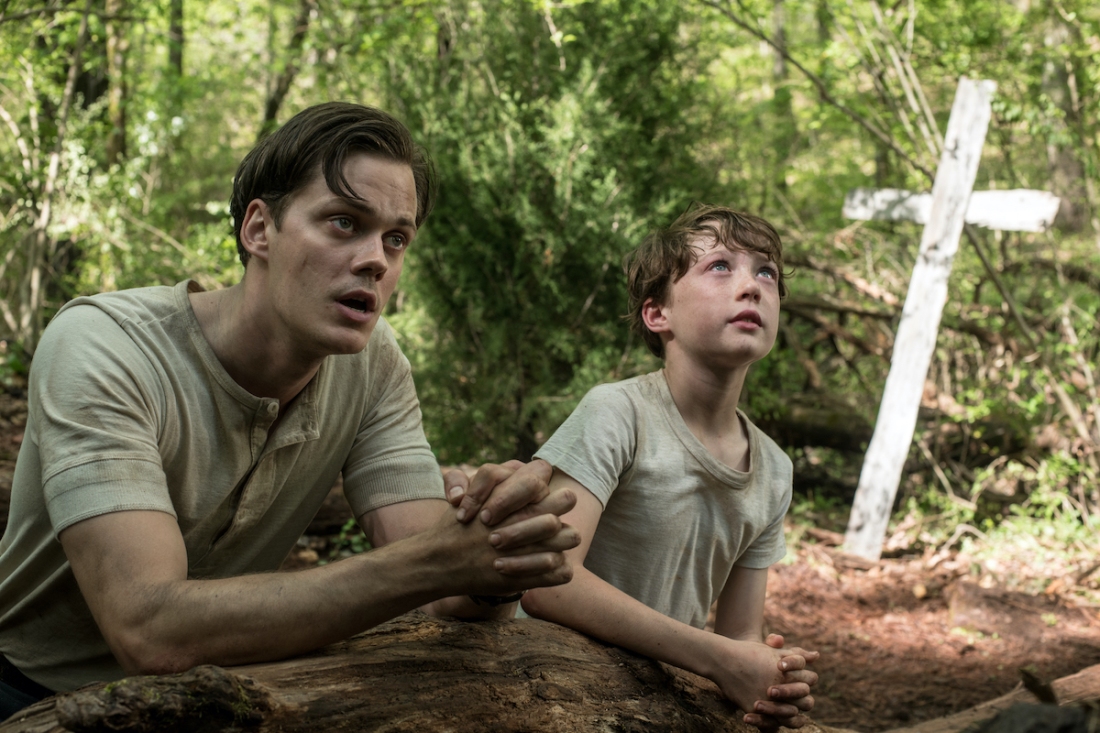
My other big gripe with the film is the heavy use of voiceover narration. In my mind, voiceover is a lazy writing tool to convey internal thoughts without putting in the work to translate them to a more visual means of exposition. Yeah, I know that not all films are created equal, and some of my favorite movies of all time use voiceover to good effect. But in Devil, it feels like the screenwriters only got halfway with their adaptation and decided to include voiceover to bridge the gap. There are moments where we are meant to understand the exact thoughts going through a character’s mind when there is no other way for us to know – for instance, that Lenora intended to back out of her suicide attempt but accidentally went through with it. But at other times we learn information through heavy-handed exposition, such as the blanks in Sandy’s gun, when they could’ve easily found a way to weave that information in more seamlessly and make the audience feel smart simultaneously.
One thing the film does do quite well is in building and sustaining tension. There is a sinister undertone to the entire film that keeps us on-edge even in the quietest moments, such that we never feel completely safe. It puts us in the shoes of someone with severe childhood trauma, never secure, always assuming the worst in people, looking over your shoulder constantly. It’s one plus of never giving us a moment of safety because we are always waiting for the other shoe to drop. If a character puts on airs of civility, we are just waiting for the moment they drop the facade and show their true monstrous colors. Once the main plot kicks in about halfway through the film we are on the edge of our seat most of the way, and that’s thanks to strong setup giving us all the proper context to care about what’s happening and what’s to come. The storylines might start out disjointed and unrelated, but once they start to intersect it’s some powerful and gripping drama. The finale isn’t even that action-packed or over-the-top, but thanks to all the quiet buildup we are primed and ready for the dramatic payoff when it finally comes.
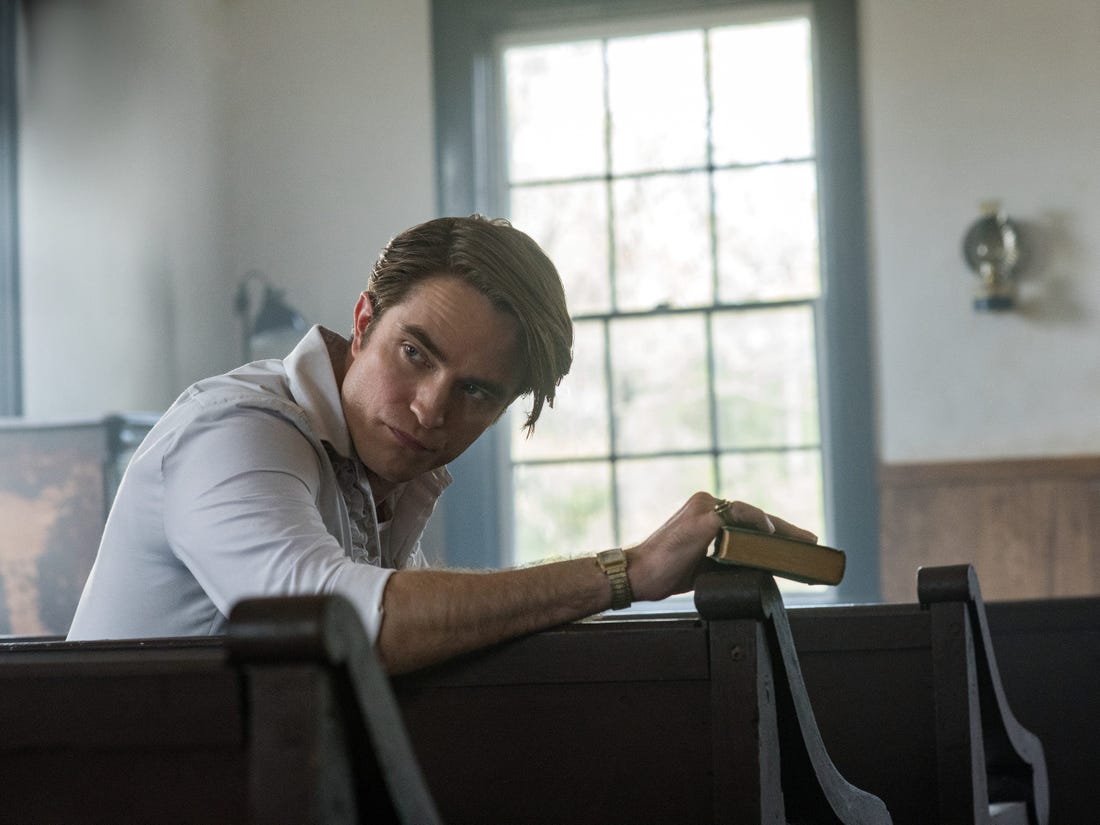
Aiding in this tension-building is the excellent direction from Antonio Campos. The cinematography is simple but never bland; it captures the desolate wilderness of these small towns but still finds ways to make things interesting. There are some riveting sequences towards the end as things come to a violent head, and the claustrophobic camera work really sells the fear and dread these characters are feeling. The worldbuilding in general is quite immersive; everything from the music to the costumes to the set design really places us in this small town in the time period. It reminded me a lot of Andrew Dominik’s The Assassination of Jesse James by the Coward Robert Ford in the way it depicts these lawless lands as something brutal and unforgiving and yet strangely beautiful. It’s not Roger Deakins-levels of eye-popping, but it still kept me engaged even as the plot sags from time to time. I’ve never seen a Campos film before, but his strong work on this project makes me want to go back and revisit some of his prior efforts.
Finally let’s talk about the acting, which is pretty stellar all around. This film is full of some of my favorite character actors, and everyone is fully committed to their roles. Tom Holland is a perfectly-suitable young protagonist; he carries the burden of this story on his shoulders and is easy to root for even as he makes dubious decisions. Robert Pattinson is ridiculously over-the-top as the sketchy pastor; he’s apparently made the decision to take every batshit-crazy character he can get his hands on, but he plays it well every time. Harry Melling has been quietly putting together an impressive filmography in his post-Potter days, and I’m always happy to see him pop up in films. Jason Clarke and Riley Keough are properly terrifying as the serial killers, Sebastian Stan is menacing as the crooked cop, Bill Skarsgard is mesmerizing as the unhinged widower with a dark past…god, there just isn’t a weak link anywhere! It’s rare to get so many talented actors in one film these days, and it’s always worth celebrating when it happens. No matter this film’s flaws, the dedicated acting elevates it to something more than the sum of its parts. I’ll be keeping this film in mind when it comes to end-of-year awards, as it’s hands-down the best ensemble cast we’ve seen in 2020 so far.
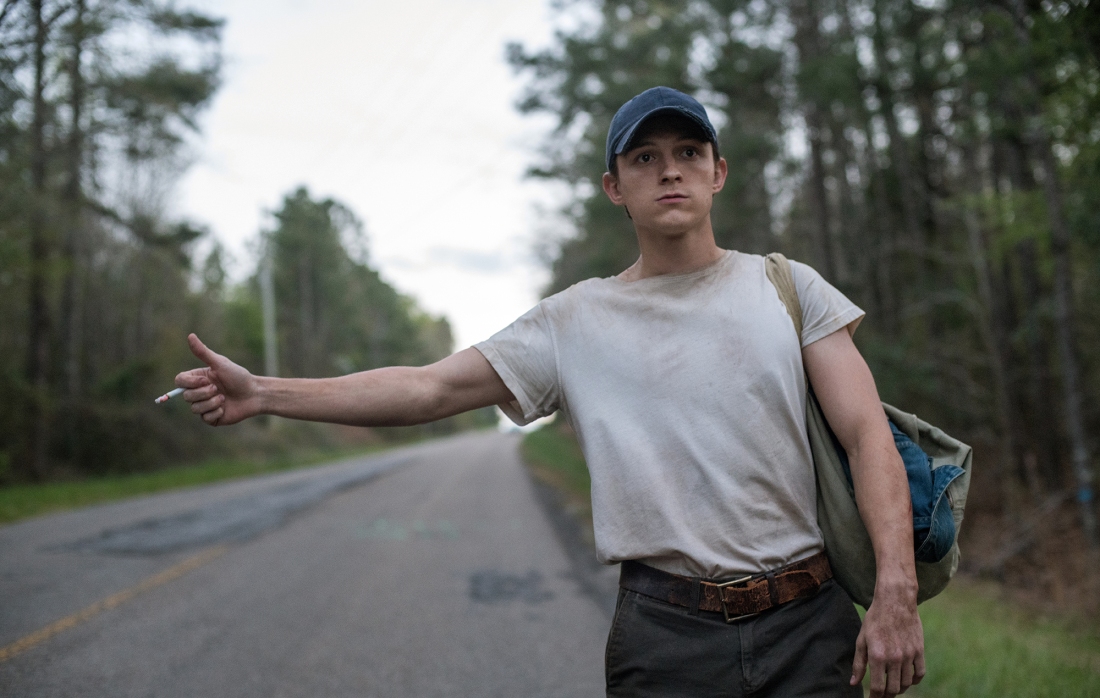
Conclusion
A fantastic ensemble cast and competent direction carries the day here, even if the source material doesn’t always lend itself to a visual medium. I enjoyed the way the film explores the intersection between religion and sin, and the multi-perspective structure mostly works because we get to see how all these different flawed people approach their relationship with faith. Some of the characters could have been better developed and the pacing sometimes suffers from the variety of people to remember. I also wish the film had found a better way to convey internal thoughts than through voiceover narration, because it always took me out of the moment. Still, it’s a powerful experience with some riveting sequences, and I enjoyed getting to know all the different characters…it’s rare that we get to spend time with such flawed individuals without the filmmaker forcing us to root for them. It probably worked better in literary form, but I’m still glad the adaptation got made.
VERDICT: B-
All image rights belong to Netflix.
Stay tuned this weekend for my reaction to the results to both Venice Film Festival and Toronto International Film Festival! I’ll be discussing the breakout films and their 2020-2021 Oscar chances at the 93rd Academy Awards. See you soon!
-Austin Daniel